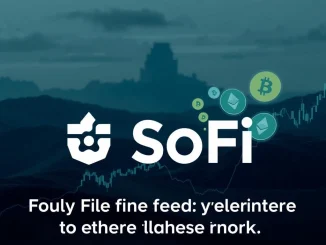
Hold onto your hats, crypto enthusiasts! In a move that has sent ripples through the digital asset world, the U.S. Department of Justice (DOJ) has just dismantled its National Cryptocurrency Enforcement Team (NCET). Yes, you read that right. The very task force created to tackle major crypto crimes under the Biden administration is no more, according to Fortune Crypto. This seismic shift comes as President Donald Trump signals a significant change in the regulatory landscape for digital currencies, hinting at a more lenient approach. But what does this bombshell announcement truly mean for the future of crypto enforcement and the safety of your investments? Let’s dive deep into this developing story.
Why the Sudden Shutdown of the DOJ Crypto Task Force?
Launched with fanfare under the previous administration, the National Cryptocurrency Enforcement Team (NCET) was envisioned as the spearhead in combating complex crypto-related crimes. Their mission? To lead the charge in investigating and prosecuting the bad actors lurking in the burgeoning digital asset space. And they weren’t just talk – the NCET tackled some high-profile cases, making headlines across the crypto sphere. Let’s take a quick look at some of their notable achievements:
- Tornado Cash Sanctions: The NCET played a key role in investigating and taking action against Tornado Cash, a crypto mixer accused of laundering billions in illicit funds. This move sent a strong message about cracking down on anonymity in crypto transactions.
- Avraham Eisenberg Prosecution: Remember the Mango Markets exploit? The NCET was instrumental in the case against Avraham Eisenberg, who was accused of manipulating Mango Markets, highlighting the DOJ’s focus on DeFi exploits and market manipulation.
- North Korean Cyber Actors: The task force also targeted North Korean cybercriminal groups leveraging cryptocurrency for illicit activities, demonstrating a commitment to national security within the digital asset realm.
Deputy Attorney General Todd Blanche stated that the decision to disband the NCET is directly linked to President Trump’s executive order. This order, according to reports, aims to ease the regulatory burden on digital assets, fostering innovation and growth within the sector. Essentially, the DOJ’s move is being framed as an alignment with the Trump administration’s broader vision for a more crypto-friendly United States. But is this truly about ‘easing regulation,’ or could there be more to this picture?
Trump’s Crypto Policy Shift: A Friendlier Stance?
Donald Trump’s evolving stance on cryptocurrency has been quite the rollercoaster. From initial skepticism to now seemingly embracing the digital asset revolution, his administration’s direction is crucial for the industry’s future in the US. This disbandment of the NCET appears to be a concrete manifestation of this shift towards a more ‘pro-crypto’ approach. But what exactly does this entail?
- Regulatory Rollbacks: The move suggests a potential rollback of some of the stricter regulatory measures implemented under the previous administration. This could mean less stringent compliance requirements for crypto businesses and potentially a more lenient approach to new crypto projects.
- Focus on Investor Fraud: Instead of broadly targeting crypto exchanges, mixers, or wallets, the DOJ will now prioritize prosecuting individuals who directly defraud crypto investors. This pivot indicates a shift from systemic enforcement to a more targeted approach focused on individual bad actors.
- Pro-Innovation Narrative: The Trump administration seems to be emphasizing the ‘innovation’ aspect of cryptocurrency, viewing it as a sector ripe for growth and job creation. Easing regulation could be seen as a way to stimulate this growth and attract more crypto businesses to the US.
However, this shift raises some critical questions. Is dialing back crypto enforcement truly beneficial for the long-term health of the industry? Could a less aggressive approach inadvertently create a more permissive environment for illicit activities and scams?
What Does This Mean for Crypto Enforcement Moving Forward?
The disbandment of the NCET doesn’t necessarily mean the DOJ is abandoning crypto enforcement altogether. Instead, it signals a strategic recalibration. The focus is narrowing, but the commitment to tackling crypto crime seemingly remains. Here’s what we can expect in terms of future crypto enforcement:
| Previous Approach (NCET Era) | New Approach (Post-NCET) |
|---|---|
| Broad targeting of crypto ecosystems (exchanges, mixers, wallets) | Prioritized prosecution of individual fraudsters targeting crypto investors |
| Emphasis on systemic risks and regulatory compliance | Focus on individual accountability and direct victim protection |
| Proactive investigations into emerging crypto technologies and trends | Potentially more reactive approach, focusing on reported fraud cases |
This shift could be interpreted in several ways. On one hand, some argue that it’s a welcome move, preventing overreach and fostering a more innovation-friendly environment. By focusing on individual fraudsters, the DOJ might be aiming for a more efficient and targeted approach to crypto crime. On the other hand, critics worry that dismantling a specialized task force like the NCET could weaken the overall enforcement capabilities in a rapidly evolving and complex space. Will general prosecutors have the same level of expertise and focus on nuanced crypto crimes compared to a dedicated team?
Digital Asset Regulation: A New Dawn or a Risky Gamble?
The broader implications of this DOJ decision extend beyond just enforcement. It signals a potential paradigm shift in how the US government approaches digital asset regulation as a whole. President Trump’s administration appears to be betting on a lighter regulatory touch to unlock the full potential of the crypto industry. But is this a calculated risk or a potentially dangerous gamble?
Potential Benefits of Easing Crypto Regulation:
- Increased Innovation: Less stringent regulations could encourage startups and established companies to innovate and build within the US, fostering technological advancements.
- Economic Growth: A thriving crypto sector can create jobs, attract investment, and contribute to economic growth. A more welcoming regulatory environment could accelerate this process.
- Global Competitiveness: By adopting a more pro-crypto stance, the US could become a more attractive destination for crypto businesses, enhancing its global competitiveness in the digital economy.
Potential Challenges of Relaxed Crypto Regulation:
- Increased Risk of Fraud: A less regulated environment could unfortunately lead to a surge in scams and fraudulent schemes, potentially harming retail investors and damaging the industry’s reputation.
- Money Laundering Concerns: Looser regulations might make it easier for illicit actors to use cryptocurrencies for money laundering and other illegal activities, raising national security concerns.
- Investor Protection Gaps: Weakened regulations could leave investors more vulnerable to market manipulation and project failures, highlighting the need for robust consumer protection measures even in a less restrictive environment.
The Future of Crypto Regulation and Enforcement: What to Expect?
The disbandment of the NCET is undoubtedly a significant development, but it’s just one piece of the puzzle in the ongoing evolution of crypto regulation and enforcement. The Trump administration’s approach is still taking shape, and the long-term consequences of these changes remain to be seen. Here are some key takeaways and actionable insights for crypto enthusiasts and investors:
- Stay Informed: The regulatory landscape is constantly shifting. Keep a close eye on developments in crypto policy and enforcement to make informed decisions.
- Focus on Security: In a potentially less regulated environment, individual responsibility for security becomes even more critical. Prioritize secure wallets, due diligence, and be wary of projects promising unrealistic returns.
- Engage with Policymakers: If you are passionate about the future of crypto regulation, engage with policymakers and advocate for responsible and balanced approaches that foster innovation while protecting consumers.
In Conclusion:
The dissolution of the DOJ’s crypto task force marks a pivotal moment for the digital asset industry in the United States. Whether this move ultimately proves to be a boon for innovation or a step back in the fight against crypto crime remains to be seen. One thing is certain: the crypto world is in for a period of significant change, and navigating this evolving landscape will require vigilance, adaptability, and a keen understanding of the shifting tides of regulation and enforcement. Keep watching this space – the story of crypto regulation is far from over!



